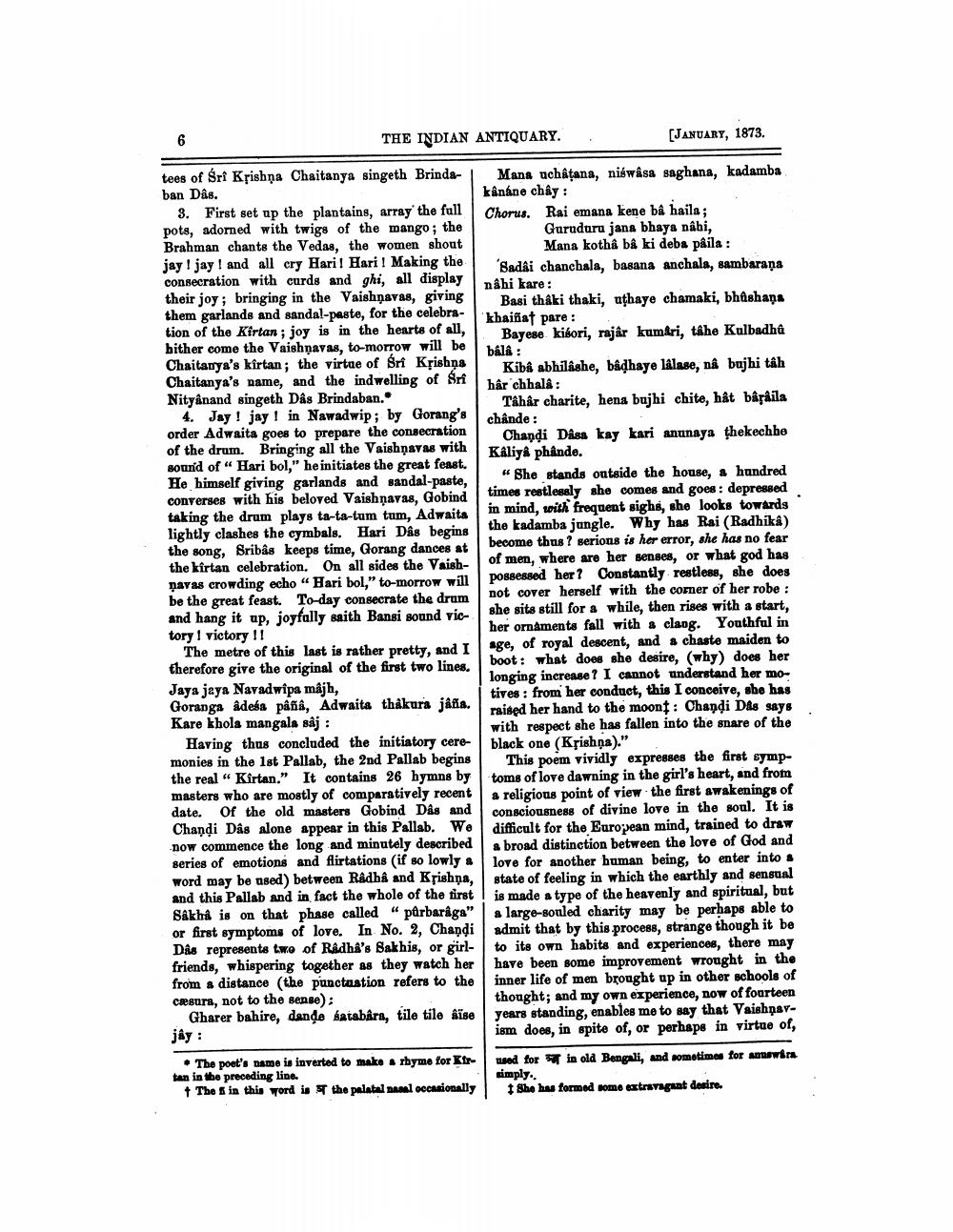________________
THE INDIAN ANTIQUARY.
[JANUARY, 1873.
tees of Sri Krishņa Chaitanya singeth Brinda- Mana uchâtana, niswasa saghana, kadamba ban Dâ8.
kênine chỉ: 3. First set up the plantains, array' the full Chorus. Rai emana kene bê haila; pots, adorned with twigs of the mango; the
Guruduru jana bhaya nahi, Brahman chants the Vedas, the women shout
Mana kotha bå ki deba pâila : jay I jay! and all cry Hari! Hari! Making the
'Badki chanchala, basana anchala, sambarana consecration with curds and ghi, all display
nahi kare: their joy; bringing in the Vaishnavas, giving
Basi thâki thaki, uthaye chamaki, bhashana them garlands and sandal-paste, for the celebra
khaiñat pare : tion of the Kirtan ; joy is in the hearts of all,
Bayese kibori, rajar kumari, tähe Kulbadha bither come the Vaishnavas, to-morrow will be
bála : Chaitanya's kirtan; the virtue of Sri Krishna
Kiba abhilashe, bâdhaye lålase, na bujhi tâh Chaitanya's name, and the indwelling of Sri
hâr chhale: Nityanand singeth Das Brindaban.
Tåhår charite, hena bujhi chite, hật bâţâila 4. Jay ! jay ! in Nawadwip; by Gorang's
chande : order Adwaita goes to prepare the consecration
Chandi Dass kay kari anunaya thekechhe of the drum. Bringing all the Vaishnavas with
Kaliyê phânde. sound of " Hari bol," he initiates the great feast. He himself giving garlands and sandal-paste,
“She stands outside the house, a hundred converses with his beloved Vaishnavas, Gobind
times restlessly she comes and goes: depressed taking the drum plays ta-ta-tum tum, Adwaits
in mind, with frequent sighs, she looks towards lightly clashes the cymbals. Hari Dâs begins
the kadamba jungle. Why has Rai (Radhika) the song, Bribas keeps time, Gorang dances at
become thus ? serions is her error, she has no fear the kirtan celebration. On all sides the Vaish
of men, where are her senses, or what god has navas crowding echo "Hari bol," to-morrow will
possessed her ? Constantly restless, she does be the great feast. To-day consecrate the drum
not cover herself with the comer of her robe : and hang it up, joyfully saith Bansi sound vic
she sits still for a while, then rises with a start, tory I victory !!
her ornaments fall with a clang. Youthful in The metre of this last is rather pretty, and I age, of royal descent, and a chasto maiden to therefore give the original of the first two lines.
boot: what does she desire, (why) does her
longing increase ? I cannot understand her moJaya jaya Navadwipa majh,
tives : from her conduct, this I conceive, she has Goranga adeba pâña, Adwaita thakura jafia.
raised her hand to the moont: Chandi Das says Kare thola mangala saj:
with respect she has fallen into the snare of the Having thus concluded the initiatory cere
black one (Krishna)." monies in the 1st Pallab, the 2nd Pallab begins This poem vividly expresses the first sympthe real " Kirtan." It contains 26 hymns by toms of love dawning in the girl's heart, and from masters who are mostly of comparatively recent a religious point of view the first awakenings of date. Of the old masters Gobind Das and consciousness of divine love in the soul. It is Chandi Dâs alone appear in this Pallab. We
| difficult for the European mind, trained to draw now commence the long and minutely described a broad distinction between the love of God and series of emotions and flirtations (if so lowly love for another human being, to enter into s word may be used) between Rådhå and Krishna, state of feeling in which the earthly and sensual and this Pallab and in fact the whole of the first is made a type of the heavenly and spiritual, but Sakha is on that phase called “parbaraga" a large-sonled charity may be perhaps able to or first symptoms of love. In No. 2, Chandi admit that by this process, strange though it be Das represents two of Radha's Bakhis, or girl- to its own habits and experiences, there may friends, whispering together as they watch her have been some improvement wrought in the from a distance (the punctastion refers to the inner life of men brought up in other schools of cæsura, not to the sense);
thought; and my own experience, now of fourteen Gharer bahire, dande satabârn, tile tile fise years standing, enables me to say that Vaishnavjây:
ism does, in spite of, or perhaps in virtue of, • The poet's name is inverted to make a rhyme for Etr- used for in old Bengali, and sometimes for s win tan in the preceding line.
simply. The I in this word is the palatal al occasionally She has formed some extravagant desire.




